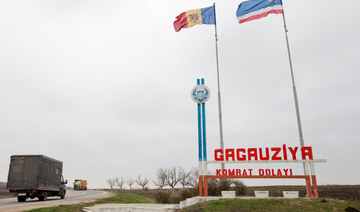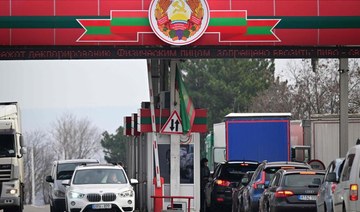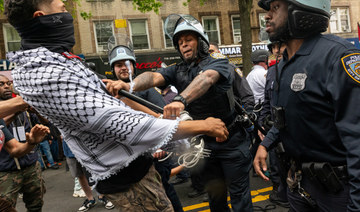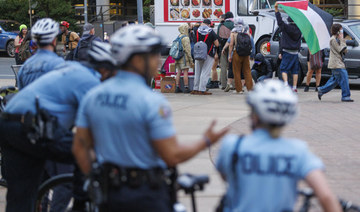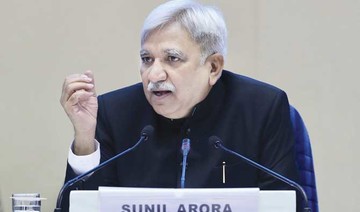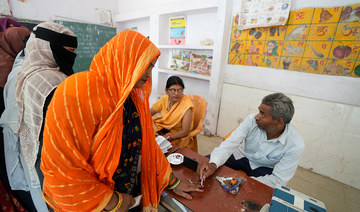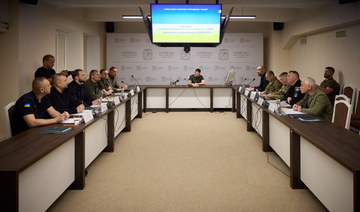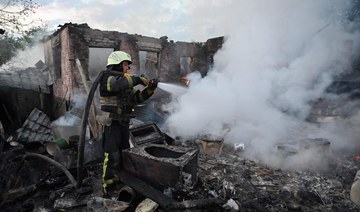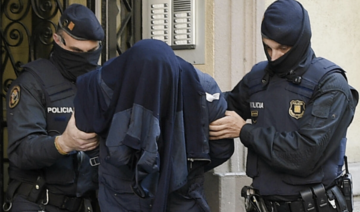WASHINGTON: A $1.7 trillion spending bill financing federal agencies through September and providing more aid to a devastated Ukraine cleared the House on Friday as lawmakers race to finish their work for the year and avoid a partial government shutdown.
The bill passed mostly along party lines, 225-201. It now goes to President Joe Biden to be signed into law.
Passage of the bill represented a closing act for Rep. Nancy Pelosi’s second stint as House speaker, and for the Democratic majority she led back to power in the 2018 election. Republicans will take control of the House next year and Rep. Kevin McCarthy is campaigning to replace her.
He is appealing for support from staunch conservatives in his caucus who have largely trashed the size of the bill and many of the priorities it contains. He spoke with a raised voice for about 25 minutes, assailing the bill for spending too much and doing too little to curb illegal immigration and the flow of fentanyl across the US-Mexico border.
“This is a monstrosity that is one of the most shameful acts I’ve ever seen in this body,” McCarthy said of the legislation.
The speech prompted a quick quip from Rep. Jim McGovern, D-Mass., who said “after listening to that, it’s clear he doesn’t have the votes yet,” a reference to McCarthy’s campaign to become speaker.
Pelosi said “we have a big bill here because we had big needs for the country,” then turned her focus to McCarthy:
“It was sad to hear the minority leader say that this legislation is the most shameful thing to be seen on the House floor in this Congress,” Pelosi said. “I can’t help but wonder, had he forgotten January 6th?”
The Senate passed the defense-heavy measure with significant bipartisan support on Thursday, but the vote was much more split in the House. Some 30 GOP lawmakers promised to block any legislative priority that comes from those Republican senators who voted for the bill and leadership urged a no vote.
The bill runs for 4,155 pages, not including amendments the Senate added. It contains about a 6 percent percent increase in spending for domestic initiatives, to $772.5 billion. Spending on defense programs will increase by about 10 percent to $858 billion.
The bill’s passage came only hours before financing for federal agencies expires. Lawmakers have passed two stopgap spending measures to keep the government operating so far for this budget year and a third was set to pass Friday as well to ensure services continue until Biden could sign the full-year measure, called an omnibus, into law.
The massive bill wraps together 12 appropriations bills, aid to Ukraine and disaster relief for communities recovering from hurricanes, flooding and wildfires. It also contains scores of policy changes that lawmakers worked to include in the final major bill being considered by the current Congress.
Lawmakers provided roughly $45 billion for Ukraine and NATO allies, more than even Biden requested, an acknowledgment that future rounds of funding are not guaranteed with a new GOP-led House.
In a dramatic address to a joint meeting of Congress on Wednesday night, Ukrainian President Volodymyr Zelensky told lawmakers that the aid was not charity, but an investment in global security and democracy.
Though Ukraine aid has largely had bipartisan support, some House Republicans have been critical of the effort, arguing the money is better spent on priorities in the US
“How can we send an additional $47 BILLION to Ukraine for security while terrorists, drugs, and criminals flood our southern border?” tweeted Rep. Matt Rosendale, R-Montana
“$100 billion to Ukraine. Let’s put that in perspective,” tweeted Rep. Thomas Massie, R-Kentucky, who included past rounds of aid in his count. “That’s more than $200 million this year from each Congressional district. What could your congressman have done for your district with $200 million?”
McCarthy has warned that Republicans would not write a “blank check” for Ukraine in the next Congress. Senate Majority Leader Chuck Schumer said after Thursday’s vote he’s having trouble understanding the concerns.
“I’m just befuddled by some of these right-wing Republicans who don’t want to help Ukraine,” Schumer said. “It’s always been, the more hard right you were, the more anti-Soviet you were, but all of a sudden, they’re pro. I hope it’s not a residue of Trump.”
The Senate passed the funding package Thursday by a vote of 68-29 but it takes time for the Senate clerk’s office to review the bill and include amendments that were added that day. As a result, the bill ended up passing with a half-empty House chamber. More than 220 lawmakers sought the option to vote by proxy, and many raced to get out of town before risking canceled flights and spending Christmas in Washington.
Republicans have vowed that abolishing the practice of remote voting will be among their first acts in the majority next year.
The funding bill also contains roughly $40 billion in emergency spending in the US, mostly to assist communities across the country recovering from drought, hurricanes and other natural disasters.
And it has scores of policy changes largely unrelated to spending that lawmakers worked furiously behind the scenes to include, else they start from scratch next year in a divided Congress where Republicans will be returning to the majority in the House.
One of the most notable examples was a historic revision to federal election law that aims to prevent any future presidents or presidential candidates from trying to overturn an election.
The bipartisan overhaul of the Electoral Count Act is in direct response to former President Donald Trump’s efforts to persuade Republican lawmakers and then-Vice President Mike Pence to object to the certification of Biden’s victory on Jan. 6, 2021.
Among the spending increases Democrats emphasized: a $500 increase in the maximum size of Pell grants for low-income college students, a $100 million increase in block grants to states for substance abuse prevention and treatment programs, a 22 percent increase in spending on VA medical care and $3.7 billion to provide emergency relief to farmers and ranchers hit by natural disasters, just to name a few.
The bill also provides roughly $15.3 billion for more than 7,200 projects that lawmakers sought for their home states and districts. Under revamped rules for community project funding, also referred to as earmarks, lawmakers must post their requests online and attest they have no financial interest in the projects. Still, many fiscal conservatives criticize the earmarking as leading to unnecessary spending.
US House passes $1.7 trillion spending bill with Ukraine aid
https://arab.news/4dn5q
US House passes $1.7 trillion spending bill with Ukraine aid

- The bill passed mostly along party lines, 225-201
Moldova turns to Russia to seek extradition of convicted politician
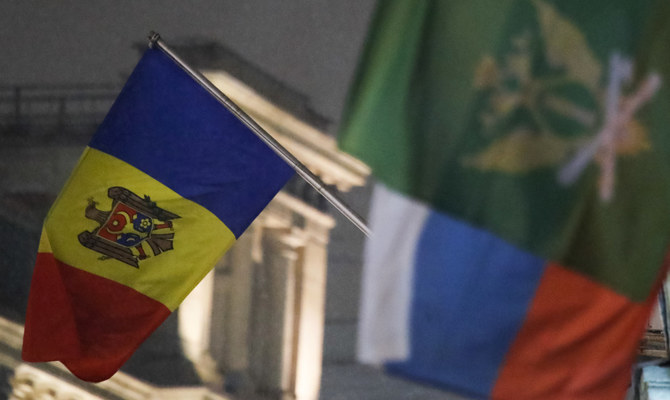
- The Victory bloc, made up of four parties, campaigns with the slogan “No to the EU” and calls for Moldova instead to join the Eurasian Economic Union — a Russian-led regional grouping
CHISINAU: Moldova is now seeking extradition from Russia of an opposition politician convicted of mass fraud after he moved there from exile in Israel, the country’s justice minister said on Saturday.
Ilan Shor, a pro-Russian business magnate, was sentenced last year in absentia to 15 years in prison in connection with the disappearance from the banking system of $1 billion in 2014, dubbed Moldova’s “theft of the century.”
Shor has organized noisy street demonstrations against pro-European President Maia Sandu and urged Moldovans to vote “no” in a referendum authorities have called for October on joining the European Union by 2030.
Justice Minister Veronica-Mihailov Moraru said Moldova would redirect its extradition appeals to Moscow after Shor said he had moved to Russia and announced he had been granted Russian citizenship.
“The justice ministry has not been informed of this by the Russian authorities,” she told TVR Moldova television.
“If we are advised officially that he holds Russian citizenship, we will analyze the circumstances and consider how to act in procedural terms.”
Moldova, an ex-Soviet state lying between Ukraine and Romania, had repeatedly sought Shor’s extradition from Israel.
After his conviction, a party bearing Shor’s name was banned by the Constitutional Court and a new party, called “Chance,” was formed in its place.
Shor is the driving force behind the “Victory” electoral bloc launched last month — in Moscow — to oppose the EU referendum and Sandu’s bid for re-election at a poll to be held on the same date.
He said last week he wanted to become prime minister if a president favorable to his views would nominate him.
Sandu denounces Moscow’s invasion of Ukraine and describes Russia and corruption as the biggest threats to her country.
The Victory bloc, made up of four parties, campaigns with the slogan “No to the EU” and calls for Moldova instead to join the Eurasian Economic Union — a Russian-led regional grouping.
It has not yet decided on a candidate to run against Sandu. The opposition Socialists and Communists, also friendly to Moscow, oppose the pro-EU referendum but have shown little inclination to cooperate with Shor and the Victory bloc.
Polish students occupy top universities to cut ties with Israeli academia
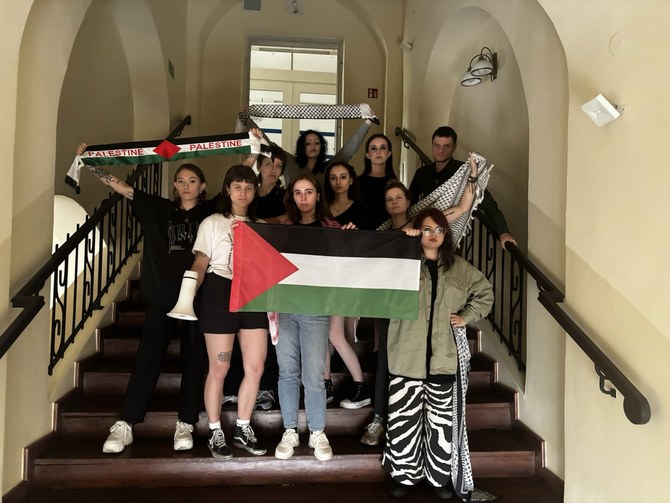
- Students set up encampments at the University of Warsaw and Jagiellonian University
- ‘We consider opposing genocide as our highest obligation,’ students say
WARSAW: Polish students have joined the global movement to end partnerships with Israeli institutions and were occupying the country’s top campuses on Saturday because of Israel’s war on Gaza.
Students and alumni of 12 universities in Poland have been calling on their management to publicly disclose which Israeli academia, research centers, organizations and companies they have been cooperating with and in what scope.
In open letters to rectors, they demanded that the universities “boycott Israeli institutions at the national and international level until the occupation of Palestine ends, recognize the right of Palestinians to equality and self-determination, and recognize the right of return for Palestinian refugees.”
As no action followed from university authorities, on Friday evening they set up encampments at the campuses of the University of Warsaw — the country’s largest academic institution — and of the Jagiellonian University — the oldest and most prestigious.
In a joint manifesto, the protesters said: “We will occupy the university space with our own bodies to demand action ... we consider opposing genocide as our highest obligation.”
Israeli airstrikes and ground offensives in Gaza have since October killed 36,000 Palestinians with more than 80,000 wounded, the vast majority children and women. Many have lost their lives as most of the hospitals have been flattened by bombardment and no medical assistance could reach them.
Protesting students say that failing to oppose the onslaught would mean tacit consent — and complicity.
The University of Warsaw is linked through a research project to the Ben-Gurion University, whose Homeland Security Institute partners with the biggest Israeli arms manufacturers such as Elbit Systems, Rafael Advanced Defense Systems and the Israeli Ministry of Defense. It is also linked to the University of Haifa, which runs special programs for Israeli forces and intelligence.
“As a student, I feel I should have a say in what our university is investing and what its partners are. We know that the university is tied to the Israeli army, forces and apartheid system,” Agnieszka, a sociology student and one of the coordinators of the strike at the University of Warsaw, told Arab News.
“That’s why I’m here ... I hope it will change something.”
Agnieszka was speaking from behind the university gate, which has been locked since Friday evening as campus authorities sealed all entry points, preventing anyone from leaving or getting inside.
People were coming to the gate and the campus fence to bring the students water, food and power banks, and to show support.
While no one could join their encampment anymore, the dozens of students gathered inside believed they could bring change.
“We’ve been protesting since October against the genocide that is occurring in Gaza, and now we’re sort of bringing it closer,” said Nena, who studies at the Faculty of Philosophy.
“We have more direct impact on the institutions we are part of.”
At the same time, 300 km away, students of the Jagiellonian University in Krakow were also locked up at their campus, posing the same demands as those in Warsaw, and vowing that they “will not be indifferent, will not be silent, will not be passive,” as they called for others to join.
“It’s important for me to be here,” Gabriela, an international relations student told Arab News from the Krakow protest site. “It’s important to show solidarity with other encampments around the world, so that authorities can’t ignore our demands any longer.”
The University of Warsaw and the Jagiellonian University have not engaged in any discussions with the protesters. Neither university commented on whether it would agree to the students’ demands. The spokesperson of the Jagiellonian University said that to “ensure the safety of the strike participants,” there was a person “appointed to monitor the situation.”
Millions of Indians beat extreme heat to cast votes
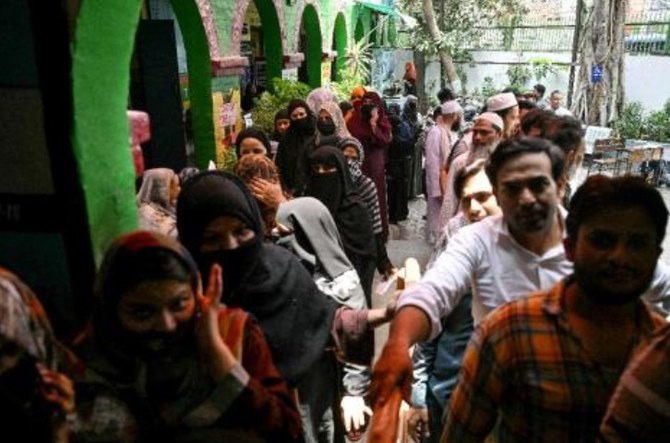
- 111 million people vote in election’s penultimate phase
- Temperature in New Delhi soared to more than 44 degrees Celsius
NEW DELHI: Voters in Delhi braved a sweltering heatwave on Saturday as they queued at polling stations in the penultimate phase of India’s general election.
The voting, which more than 968 million people have been eligible to do, started on April 19. Some of India’s 28 states and eight federally governed territories completed the process in a single day, while others have spread it out.
The sixth phase of the poll covered the capital, Delhi, as well as the neighboring states of Haryana and Uttar Pradesh, Jharkhand, Odisha, West Bengal and Bihar in the country’s east, and Jammu and Kashmir.
In Delhi, voters queued to cast their ballots despite the temperature soaring to over 44 degrees Celsius — with humidity making it feel like 56 C, according to reports — prompting the Election Commission to deploy paramedics to some polling stations.
While there have been concerns over voter turnout — with the first phase estimated to have seen at least 4 percent fewer people take part than in 2019’s election — those who arrived to cast their votes said there was no way the heat could deter them.
“Voting is the only way we can convey our feelings toward governance. It is a decisive way. To spend one hour in the line after five years is not a big deal for us,” said Karan Sharma, who was voting in the East Delhi constituency.
“We were complaining about the heat, but ... it’s a duty, it’s like eating food. After every five years, the festival comes, we have to participate in it.”
For Kavita Wadhwa, who cast her vote in the New Delhi constituency, it was a matter of exercising her rights.
“We have the right to select our own leaders,” she told Arab News. “It’s important for us ... It’s a democratic country.”
The election sees Prime Minister Narendra Modi chasing a third straight five-year term in power, targeting 400 of the 543 parliamentary seats for the National Democratic Alliance led by his Hindu nationalist Bharatiya Janata Party, which has been in power since 2014.
He is challenged by an alliance of two dozen opposition parties — the Indian National Developmental Inclusive Alliance (INDIA), led by the Congress Party, which ruled the country for close to 45 years following its independence in 1947.
Modi’s key contender is Congress leader Rahul Gandhi, the son of Rajiv Gandhi, a grandson of Indira Gandhi, and a great-grandson of Jawaharlal Nehru — all of whom were prime ministers of India.
Gandhi also cast his vote in Delhi on Saturday, after which he took to social media to encourage others to follow suit.
“Your vote will not only improve your life but will also protect democracy and the Constitution,” he said on X. “Come out of your homes in large numbers and vote for your rights and the future of your family.”
Around 111 million people were eligible to vote in the sixth phase of the election. Some of them, like Arohi Anand, were voting for the first time.
“I think it’s a great right ... The government is for us — if we don’t vote, it is on us,” he told Arab News. “(The heat) is a secondary thing. The most important thing is our vote, because the government is the most important thing; it will shape our future.”
The party or coalition that wins at least 272 of the 543 contested seats in the lower house of parliament will form the government.
The first five phases of the election have already decided the fate of 429 representatives. Saturday’s vote will add another 58.
The seventh and final phase of the election will be held on June 1. Vote counting will take place on June 4.
Russian strike on Kharkiv hardware store kills two: official
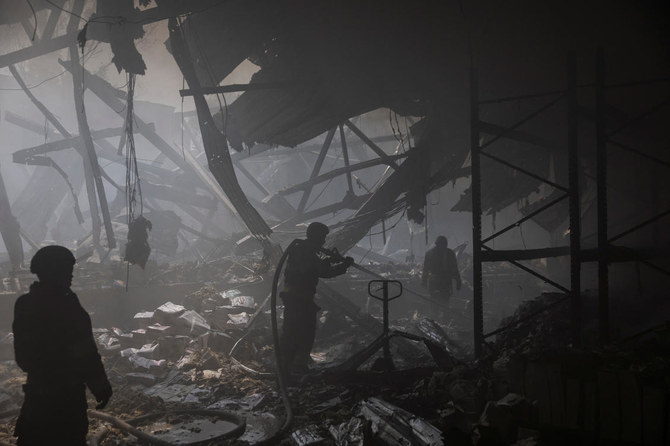
- Kharkiv regional governor Oleg Synegubov said that “two Russian guided bombs hit a construction hypermarket“
- Videos posted by witnesses on social media showed a huge column of black smoke billowing into the sky from the Epitsentr store
KYIV: A Russian strike on Saturday hit a store selling building materials in the eastern Ukrainian city of Kharkiv, killing at least two people, its mayor said.
“We know for sure about two dead,” Kharkiv mayor Igor Terekhov wrote on Telegram, saying that according to preliminary information the strike hit a hypermarket for construction materials in a residential area.
Kharkiv regional governor Oleg Synegubov said that “two Russian guided bombs hit a construction hypermarket” and “a fire broke out over 15,000 square meters.”
Videos posted by witnesses on social media showed a huge column of black smoke billowing into the sky from the Epitsentr store, located in an area of large stores beside a car park. The chain of hypermarkets sells household and DIY goods.
“We have a large number of people missing. There are many wounded,” Terekhov wrote on Telegram.
“Apparently, the attack was on a shopping center where there were many people — this is pure terrorism.”
The city of Kharkiv, Ukraine’s second largest, regularly comes under attack from Russian missiles.
Strikes on the city killed at least seven people on Thursday, local authorities said.
Russia launched a ground offensive in the northeastern Kharkiv region on May 10, but Ukraine said Friday that it had managed to halt its progress.
British man charged after allegedly joining Syrian terror group
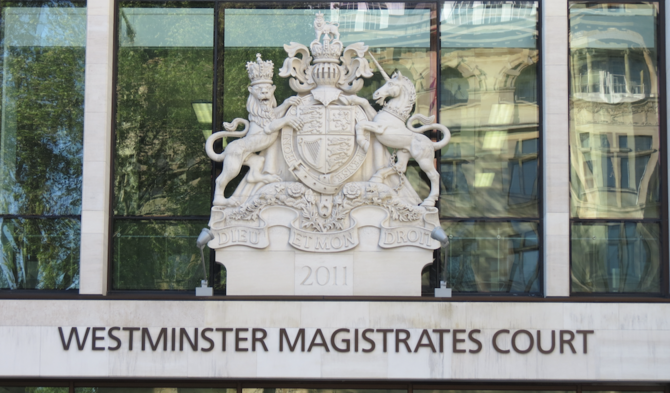
LONDON: A British man who allegedly travelled to Syria to fight for the Jaish Al-Fatah group has been charged with terrorism offences, the Metropolitan Police said on Saturday.
Isa Giga was arrested after arriving in London aboard a flight from Turkey on Thursday.
He was due to appear at Westminster Magistrates’ Court on Saturday. He is suspected of traveling to commit acts of terrorism.
“We have been clear for some time now that should anyone return to the UK whom we suspect of being involved in any terrorist-related activity overseas, then they can expect to be thoroughly investigated,” Commander Dominic Murphy, head of the force’s Counter Terrorism Command told the BBC.
“We work very closely with other partners and agencies here in the UK and overseas in order to do this and help keep the public safe.”



